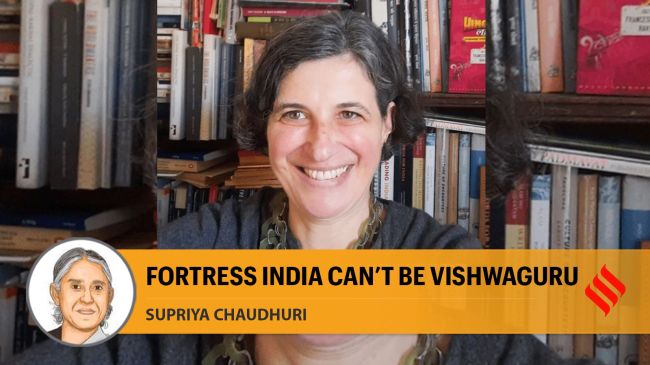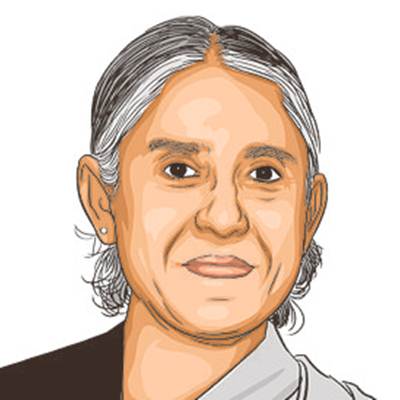Opinion The principal loser as a result of Professor Francesca Orsini’s deportation is India
Worldwide, we are witnessing a return of the “fortress” mentality that seeks to protect intellectual resources by making them more difficult to access. Unfortunately, as Tagore knew, reason and knowledge do not flourish if they are dammed up or placed behind walls
 Francesca Orsini
Francesca Orsini I woke up today to the appalling news that Francesca Orsini, preeminent global scholar of Hindi and the early modern literary world of North India, had been barred from entering India and deported to Hong Kong. On the night of October 20, when she reached Delhi after a conference in China, she was stopped and her passport was impounded, with no reason given. She has lived and worked in London for many decades now, having taught at the University of Cambridge and at SOAS, where she is now professor emerita and was professor of Hindi and chair of the Centre for Cultural Studies. She is a Fellow of the British Academy, has held visiting appointments at leading universities around the world, and her many books have made an unsurpassed impact, placing Hindi and the North Indian vernaculars within the landscape of “world literature.”
In particular, we should mention The Hindi Public Sphere 1920-1940: Language and Literature in the Age of Nationalism (2002); Print and Pleasure: Popular Literature and Entertaining Fictions in Colonial North India (2009); and most recently, East of Delhi: Multilingual Literary Culture and World Literature (2023). She has edited volumes like Before the Divide: Hindi and Urdu Literary Culture (2010) and After Timur Left: Culture and Circulation in Fifteenth-Century North India (2014), and made major contributions to the scholarship on print history and world literature on behalf of Hindi and Urdu. She is a co-editor of the Cambridge Studies in World Literature and Cultures series.
In fact, such is the measure of Orsini’s scholarship and love for the languages and cultures of North India that one would expect her to be officially honoured by the Government of India, not deported in disgrace. Trained at the University of Venice, then in Delhi on a Government of India scholarship, and finally at SOAS, she has been visiting India for many decades, and has formed deep and enduring relationships with writers and scholars here. She has many dear friends in this country, and had planned to visit them.
Orsini has often spoken of regarding India, especially Prayagraj, as her second home, a land whose bewildering variety of languages, peoples and cultures offers the ideal perspective from which to understand the conceptual model of world literature. What I have found most inspiring about her work is the combination of textual rigour and infectious enthusiasm, her capacity to make reading and understanding a journey of pleasure rather than a dry, soulless accumulation of knowledge.
While Orsini was given no reason for her deportation — adding to her bewilderment and trauma — it is now learnt that she had been blacklisted in March 2025 for violating visa conditions. An unnamed home ministry official said that she had carried out research while on a tourist visa. The same visa violations were adduced in the case of the deportation from Thiruvananthapuram in March 2022 of Professor Filippo Osella, a senior anthropologist at the University of Sussex, who had spent more than three decades researching in Kerala. In fact, Osella did have a research visa when he was deported, and he has strongly contested the ministry’s unspecified and unproven charges of “misuse” of earlier visas.
For Orsini, too, the charge of visa violations remains vague and unspecific, since the research of a senior academic, especially in the field of literature, may not be a matter of a certified project, but simply a period spent reading, thinking and talking to peers. As a quick look at India’s incredibly complicated visa categories shows, the actual research visa involves time-bound institutional affiliation. This may be irrelevant when the long-term study that lies behind a book has been ongoing for 10 years and more — as it has been, for example, in the case of Orsini’s work on the literary cultures of Awadh, published in East of Delhi. That home ministry officials would take the trouble to track senior academics in order to place them on a blacklist does not sound like routine housekeeping, but more like deliberate hounding of prominent targets by a government that is “insecure, paranoid and even stupid”, to quote Ramachandra Guha.
The larger question is, who or what is harmed by the ministry’s blacklisting of senior, well-respected academics whose work has contributed to scholarship on India and to global knowledge generally? The scholar in question is deterred from visiting India again, and she and others like her are discouraged from choosing India and Indian subjects as research fields. What does this do for India’s global standing? One aim of India’s National Education Policy (NEP) 2020 is to regain for India the lost status of Vishwaguru, or world mentor. Can this be done by driving away those who genuinely wish to learn, write, and teach about India, and cutting off the international collaborations and contacts that are crucial to the intellectual growth of Indian scholars?
It is ironic, as commentators have noted, that Orsini’s major scholarship is devoted to Hindi, a language our central government is otherwise anxious to force down the throats of all citizens. Meanwhile, our education ministry is almost pathetically insistent on improving the global rankings of Indian universities, a process that involves internationalisation, intellectual cooperation, and improvement in the global perception of Indian institutions. Getting rid of our few remaining friends in the international academy is hardly the way to go about this.
Let me say unequivocally that the principal loser as a result of Orsini’s deportation is India and scholarship on India. Worldwide, we are witnessing a return of the “fortress” mentality that seeks to protect intellectual resources by making them more difficult to access, and a resurgence of the kind of crude nationalism that is wedded to the same protectionist ideology. Unfortunately, as Tagore knew, reason and knowledge do not flourish if they are dammed up or placed behind walls. Orsini has not simply helped us to understand our own cultural heritage, she has helped the world to see it. The Indian government should apologise to her and invite her back as an honoured guest.
The writer is professor (emerita), Department of English, Jadavpur University





